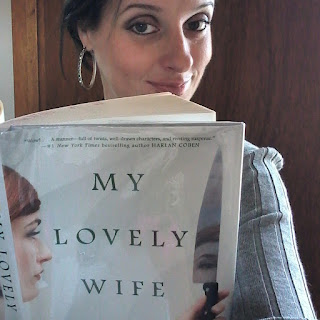 Since giving birth, I've read the last half of Sold On A Monday, the entirety of The People We Hate at the Wedding, and half of This Is Not Over, and yet I managed to read I'm Thinking Of Ending Things by Iain Reid in exactly two days. And those two days involved the older kids being home from school, and the first drop in temperature and snow storm, virtually stranding them inside the house. I first saw this book - where else? - on Instagram, and when I saw it in Target, I bought it for this tagline alone: "You will be scared. But you won't know why." In my ever-evolving reading career, I've grown to appreciate books with little to no description, and I even find myself steering away from books with overly long and complicated synopses. I'm Thinking of Ending Things lives up to its limited description. You will be scared and you won't know why, and then you will feel incredibly uncomfortable.
Since giving birth, I've read the last half of Sold On A Monday, the entirety of The People We Hate at the Wedding, and half of This Is Not Over, and yet I managed to read I'm Thinking Of Ending Things by Iain Reid in exactly two days. And those two days involved the older kids being home from school, and the first drop in temperature and snow storm, virtually stranding them inside the house. I first saw this book - where else? - on Instagram, and when I saw it in Target, I bought it for this tagline alone: "You will be scared. But you won't know why." In my ever-evolving reading career, I've grown to appreciate books with little to no description, and I even find myself steering away from books with overly long and complicated synopses. I'm Thinking of Ending Things lives up to its limited description. You will be scared and you won't know why, and then you will feel incredibly uncomfortable.The book doesn't offer a synopsis, so I won't either, but that might just be an impossible task, anyway. How do you describe a book like this? This book? It's short and to the point even though there are moments when it feels like the story is getting away from you. It is, at times, overly complicated, but in a way that makes you feel creepily disoriented, like you're walking through a maze of mirrors. It is a scary story, but it also offers insight and epiphanies into the complex function of our brains and our minds, and what it means to be human. It's like those dreams where nothing innately scary happens, but you wake up feeling weird and scared, anyway. Between reading this book and watching The Good Place, my mind has been properly fucked with.
I don't usually read scary stories until this time of year, just like I only read beach-reads in the summer, and I am always hoping that what I choose will be scarier than The Shining, even books deemed, "scary as hell," by King, himself. But nothing has measured up to The Shining, not even Pet Sematary, which is scary for an entirely different reason altogether. I'm Thinking of Ending Things definitely keeps you guessing and keeps the pages turning; there is no way you won't want to know the conclusion, until you do, and then you kind of wish you didn't.
In my limited knowledge of triggers, I believe the end of this novel is one. BUT, I can't tell you what the trigger is without spoiling not just the ending, but the entire book as well. The end isn't exactly unexpected, but it is disturbing, and I honestly don't know how I would be able to watch the Netflix movie after having read the book. Well, ok...I am slightly curious...maybe tomorrow as it continues to snow...⭐⭐⭐⭐/5 on goodreads. CLICK HERE TO PURCHASE $5.00 Like New.
🌟SHIPPING SPECIAL🌟 With the continued pandemic, I will continue to offer half-off shipping. Click the link for details.












